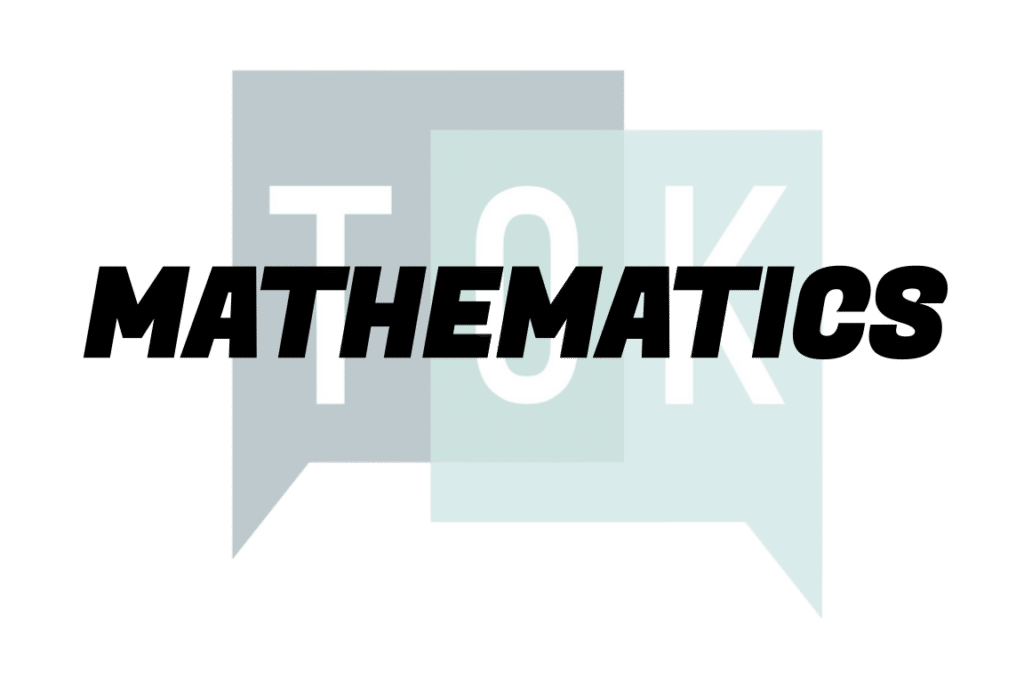
Welcome to the mathematics section of the site. This page will help you to take ownership of mathematics via a quick overview, and four padlets that offer you quotes, knowledge questions, real-world issues, and key thinkers relating to this area of knowledge.
You can use this content both to understand this component of TOK, and support discussions and arguments that you offer in your essay and exhibition.
Mathematics: a quick overview
Mathematics, often referred to as the universal language, is an indispensable area of knowledge that provides a framework for understanding, modelling, and solving problems related to quantity, structure, space, and change. It is the systematic exploration of patterns and relationships that govern our world. As we delve into this realm, we encounter several key concepts.
Certainty is a foundational concept in mathematics, where rigorous proofs and logical reasoning lead to undeniable conclusions. Explanation involves the articulation of mathematical principles to reveal underlying patterns and structures. The notion of objectivity underscores the universality of mathematical truths, transcending cultural and subjective perspectives.
Two influential thinkers in the realm of mathematics from diverse backgrounds are Ada Lovelace and Srinivasa Ramanujan. Ada Lovelace, an English mathematician and writer working in the 19th century, is recognized as the world’s first computer programmer. Her work on Charles Babbage’s Analytical Engine laid the groundwork for modern computer
programming. Srinivasa Ramanujan, an Indian mathematician from the early 20th century, made profound contributions to number theory and mathematical analysis, despite minimal formal training.
Contemporary issues within mathematics often revolve around the practical applications and ethical considerations of mathematical models. The discussions on algorithmic bias highlight the responsibility to ensure that mathematical algorithms used in various fields, from finance to artificial intelligence, do not perpetuate discrimination or inequality. Additionally, the exploration of the role of mathematics in climate modeling emphasizes the power and limitations of mathematical models in addressing complex global challenges.
Exploring mathematics via the TOK course invites students to consider the language of patterns, embrace the certainty of logical reasoning, and critically analyze the ethical implications of mathematical applications. It underscores the importance of objectivity, universal truths, and the ethical considerations inherent in applying mathematical principles to real-world problems.
1 QUOTES Who said “Mathematics allows for no hypocrisy and no vagueness”?
Explore these quotes on mathematics by a wide range of different thinkers. Which quotes are the most and least insightful? How they challenge our assumptions about mathematics? What do they reveal about links between mathematics and other aspects of the TOK course?
2 KNOWLEDGE QUESTIONS Is mathematical knowledge always abstract?
Identifying and exploring knowledge questions (KQs) is at the heart of TOK, prompting us to reflect on our knowledge, evaluate whether it’s be based on a flawed or incomplete assumptions, and provide us with a focus point to improve our understanding of the world.
3 REAL-WORLD ISSUES Should sports predictions be made by humans or AI-tools?
These examples will help you to understand how TOK ideas manifest in the real-world, take ownership of mathematics, link TOK to the latest global issues, and become an authentic critical thinker. They will also help you to justify and explore the discussions you offer in your essay and exhibition.
4 KEY THINKERS What does Cathy O’Neil say about the objectivity of mathematics?
The thinkers in this padlet will help you to consolidate your understanding of mathematics, and challenge your assumptions about the world. You can also draw on their ideas to support your essay and exhibition discussions, and add depth and authority to the claims you make about knowledge.

Subscribe to the free TOK newsletter!
Subscribe to our free newsletter, and collect fantastic examples to help you understand the key TOK ideas, support your essay and exhibition, and make you an authentic critical thinker.
You’ll encounter some of the most important thinkers from the past and the present, go beyond the headlines of contemporary events and issues around the globe, and see how TOK concepts manifest in the real-world. Subscribe HERE!